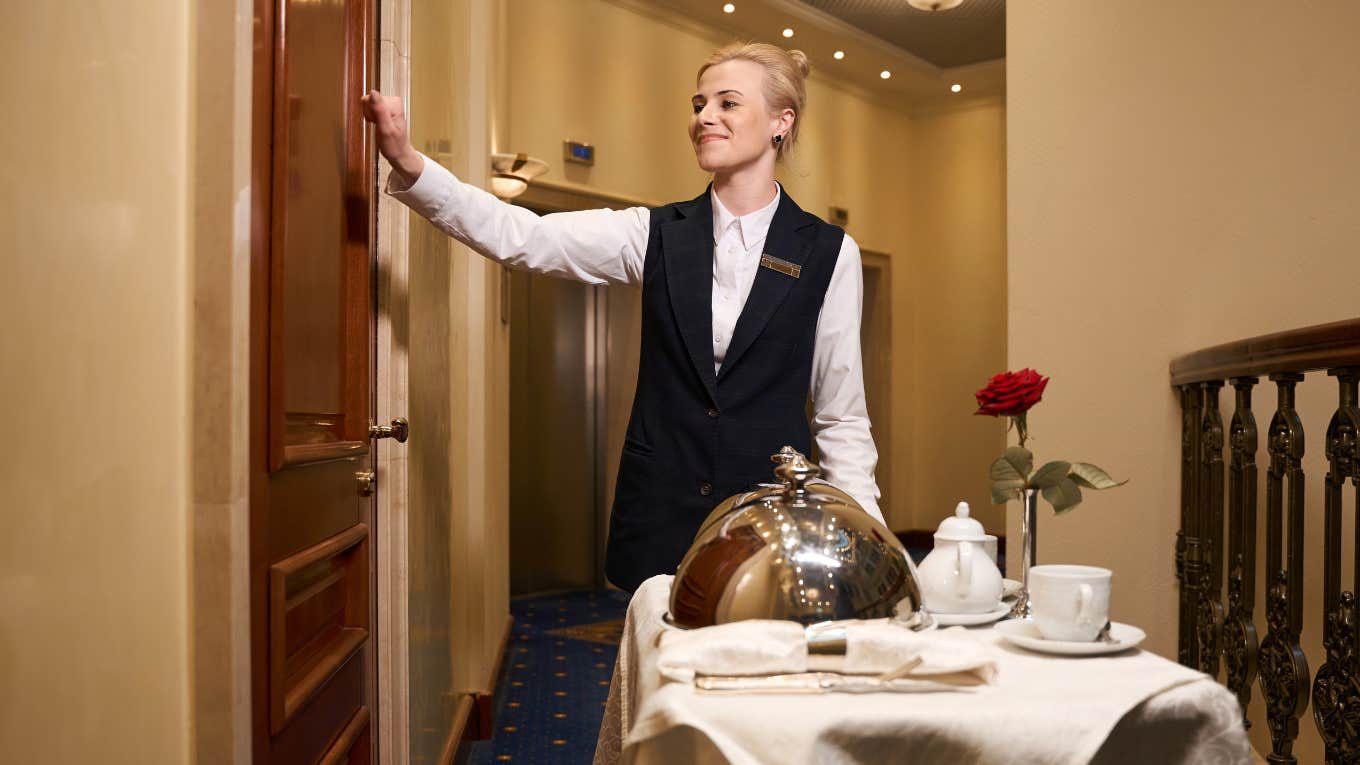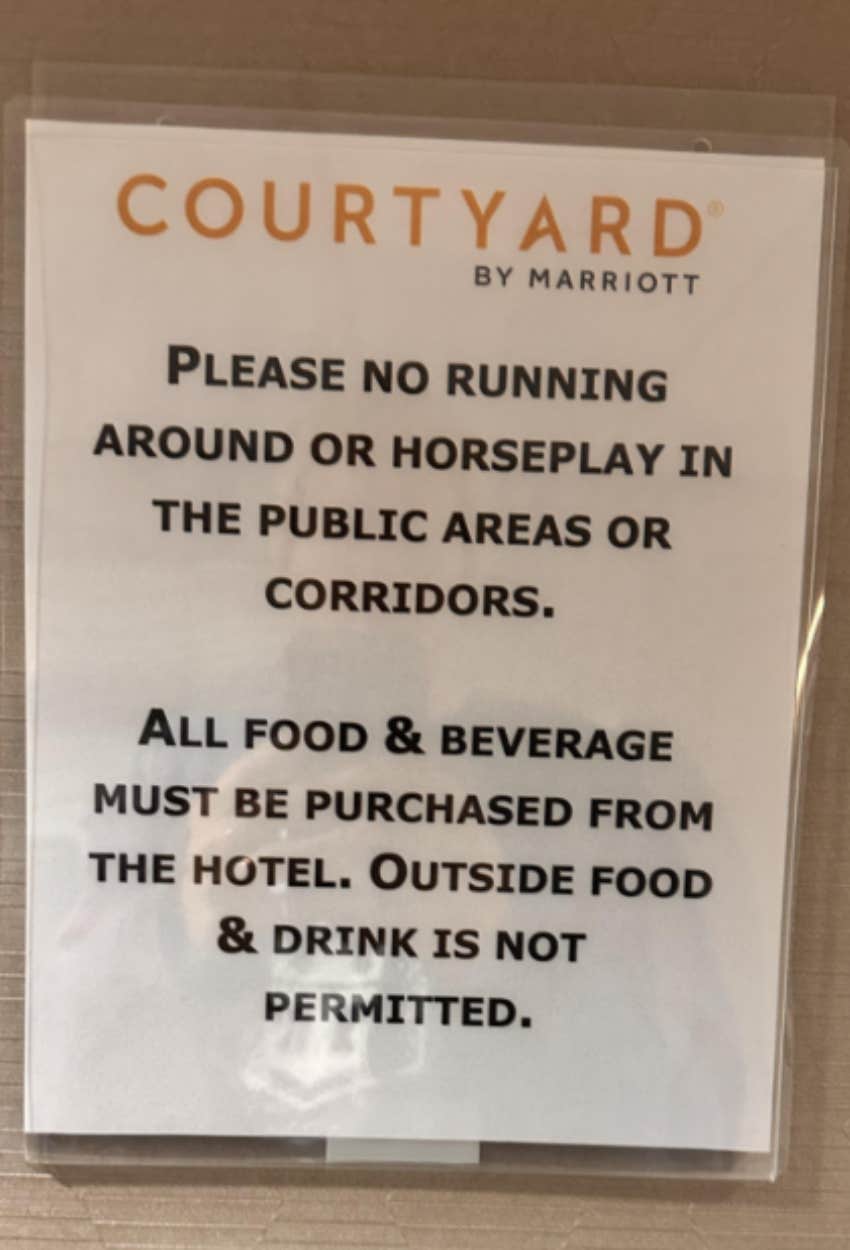Hotel Bans Guests From Bringing In Any Outside Food Or Drinks
What about late night snacks?!
 YAKOBCHUK VIACHESLAV | Shutterstock
YAKOBCHUK VIACHESLAV | Shutterstock When staying in a hotel, it's normal to bring snacks and drinks — those mini-fridges are there for a reason. However, an anonymous user on Reddit shared their surprise after encountering a sign at a Courtyard by Marriott that stated no outside food or drinks allowed on the property.
The sign was posted near the elevator and read: "All food and beverage must be purchased from the hotel. Outside food and drink is not permitted." This strict policy left critics wondering if this was a common practice at hotels or an isolated incident.
A Courtyard by Marriot posted a sign prohibiting guests from bringing outside food or drinks into the hotel.
The hotel’s policy raised eyebrows, to say the least. While some understood that hotels might want to control the sale of food and drinks in certain areas, such as restaurants or their event spaces, banning food altogether seemed to be excessive. Some users noted that as guests, they often bring their own snacks, especially for convenience or dietary preferences, and they found it troubling that such a broad rule would be enforced.
 Reddit
Reddit
One commenter questioned whether the rule was a possible attempt to boost the hotel’s food and beverage sales; however, if that is the case, it wouldn't be fair to restrict guests from enjoying their own meals in their rooms or common areas.
Others pointed out how it would be almost impossible to enforce since guests often bring in their own meals or snacks discreetly. This conversation led to a bigger question: Where is the fine line between enforcing business interests and respecting guest autonomy?
A Courtyard Marriot manager explained that the sign likely meant no outside food in the designated restaurant area, not in the rooms.
After the post gained traction, a user who claimed to be a manager at a Courtyard by Marriott location offered some clarification. They explained that the no outside food rule normally applies to the hotel's bistro area rather than the entire property.
For example, if guests brought their own bottle of wine, they would not be allowed to drink it in the bistro seating area, but they could certainly enjoy it in their own rooms. However, this important detail was never conveyed in the original sign, which led to confusion among guests. The sign posted near the elevator seemed to suggest that no outside food or drink was allowed anywhere in the hotel, which was not the case, according to the manager’s comment.
Restrictive policies at hotels spark debate because guests are paying for an indulgence, and these rules seem restrictive.
While many hotels have policies regarding outside food and drink, they are often more focused on areas like restaurants or shared spaces. This is because they don’t want outside food and drink to conflict with the hotel’s own offerings. However, odd rules such as these raise questions about fairness and convenience for guests. For example, if a guest brings in snacks or drinks for a special occasion or for dietary reasons, banning outside food altogether may feel unnecessarily restrictive to them.
 Tansu Topuzoglu | Canva Pro
Tansu Topuzoglu | Canva Pro
Some people may want to avoid hotel prices for basic items such as bottled water or snacks and instead bring their own. Policies like this may be seen as a way for hotels to push guests into spending more money at hotel-owned food and beverage outlets.
Although it is understandable for hotels or businesses to encourage guests to use the amenities they provide, clear communication about such rules is crucial to avoid confusion or frustration. Hotels must find a balance between ensuring the comfort and convenience of their guests and maintaining their own interests as a business. Clear language and well-communicated policies can help with expectations and avoid unpleasant surprises for guests.
Erika Ryan is a writer working on her bachelor's degree in Journalism. She is based in Florida and covers relationships, psychology, self-help, and human interest topics.

